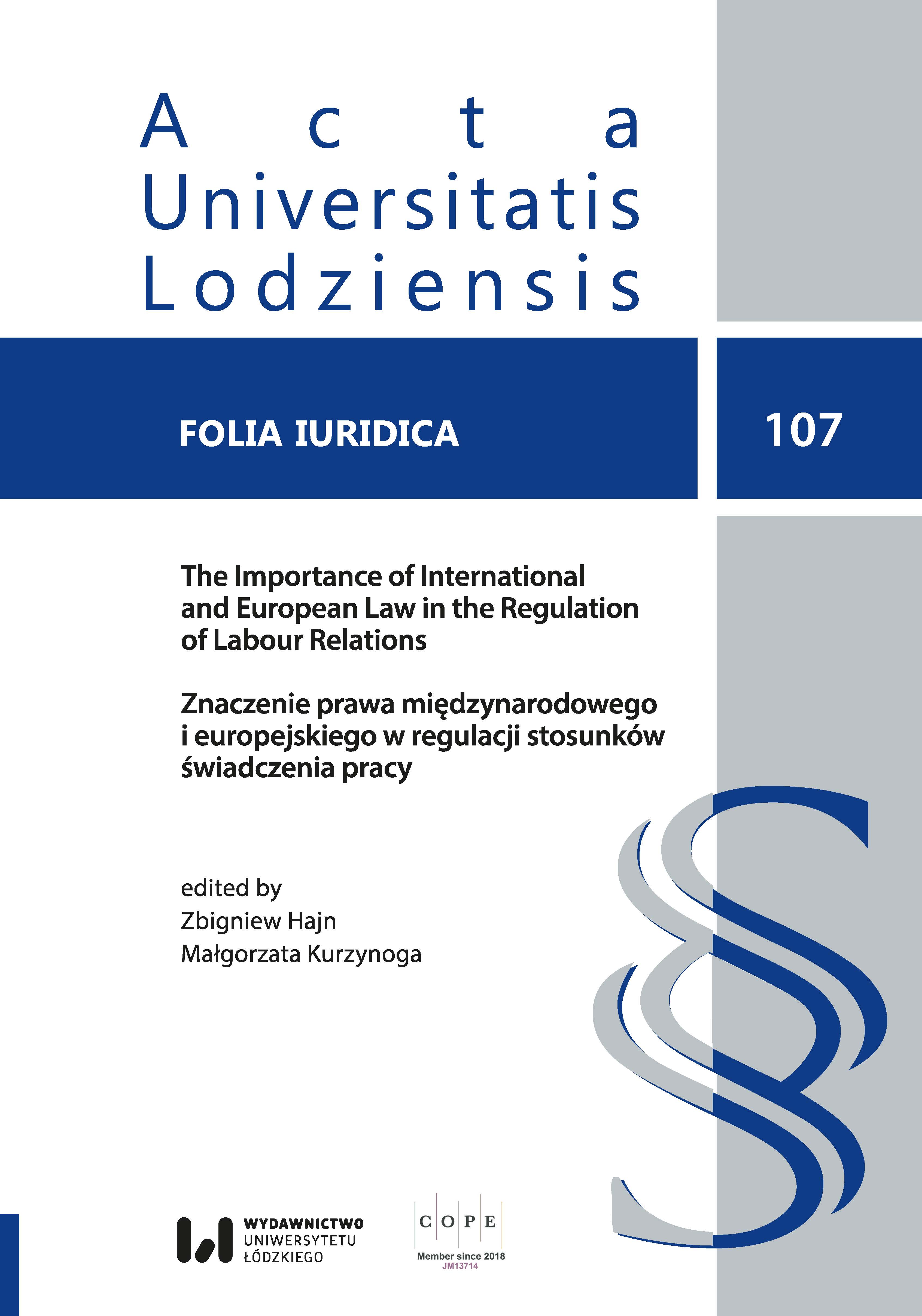The Role of the International Labour Organisation in Shaping Working Conditions in the Textile Industry
DOI:
https://doi.org/10.18778/0208-6069.107.11Keywords:
textile industry, labour rights, ILO, child labour, fair wages, working conditionsAbstract
Over the years, concerns about working conditions and labour rights within the textile industry have become increasingly prominent. Addressing these issues, the International Labour Organisation (ILO) has played a pivotal role in shaping and improving working conditions across the textile sector. This paper aims to explore the key legal regulations and non-legislative initiatives undertaken by the ILO. The author refers to the texts of the conventions, studies of the ILO and other organisations, as well as the literature on law. The research conducted indicates that the ILO’s actions positively impacted the textile industry’s labour practices globally. Nevertheless, the author argues that it is necessary to adopt a convention specifically dedicated to labour rights in the textile industry, thereby promoting fair and sustainable practices that benefit workers, businesses, and economies.
Downloads
References
Berik, Günseli. Yana Van Der Meulen Rodgers. 2010. “Options for Enforcing Labour Standards: Lessons from Bangladesh and Cambodia.” Journal of International Development 22: 56–85.
Google Scholar
Góral, Zbigniew. Aneta Tyc. 2019. “Konwencje i zalecenia Międzynarodowej Organizacji Pracy.” In System Prawa Pracy. Vol. 9. Międzynarodowe publiczne prawo pracy. Standardy globalne. 64–65. Ed. by Krzysztof W. Baran. Warszawa: Wolters Kluwer.
Google Scholar
ILO. 2019. The future of work in textiles, clothing, leather and footwear. Working Paper No. 326. Geneva: International Labour Organization. https://www.ilo.org/wcmsp5/groups/public/---ed_dialogue/---sector/documents/publication/wcms_669355.pdf
Google Scholar
ILO. 2019a. Promoting Decent Work in Garment Sector Global Supply Chains. Highlights and Insights from the ILO project Labour Standards in Global Supply Chains: A Programme of Action for Asia and the Garment Sector (LSGSC). Geneva: International Labour Organization. https://www.ilo.org/wcmsp5/groups/public/---ed_protect/---protrav/---travail/documents/projectdocumentation/wcms_681644.pdf
Google Scholar
ILO. 2020. The supply chain ripple effect: How COVID-19 is affecting garment workers and factories in Asia and the Pacific. Geneva: International Labour Organization. https://www.ilo.org/wcmsp5/groups/public/---asia/---ro-bangkok/documents/briefingnote/wcms_758626.pdf
Google Scholar
ILO. 2022. Employment, wages and productivity trends in the Asian garment sector Data and policy insights for the future of work. Geneva: International Labour Organization. https://www.ilo.org/wcmsp5/groups/public/---asia/---ro-bangkok/documents/publication/wcms_848624.pdf
Google Scholar
ILO. 2022a. Employment, wages and productivity trends in the Asian garment sector Data and policy insights for the future of work. Geneva: International Labour Organization. https://www.ilo.org/wcmsp5/groups/public/---asia/---ro-bangkok/documents/publication/wcms_848624.pdf
Google Scholar
ILO. 2022b. The future of work and skills in the textiles and clothing sector Anticipating skills needs and finding solutions through social dialogue in Brazil, Ethiopia, Jordan and Peru. Geneva: International Labour Organization. https://www.ilo.org/wcmsp5/groups/public/---ed_dialogue/---sector/documents/publication/wcms_855495.pdf
Google Scholar
ILO. 2022c. Safety and health in textiles, clothing, leather and footwear. Code of practice. Geneva: International Labour Organization. https://www.ilo.org/wcmsp5/groups/public/---ed_dialogue/---sector/documents/normativeinstrument/wcms_828429.pdf
Google Scholar
ILO. 2023a. Challenges and opportunities to advance decent work in five countries and supply chains: A synthesis report. Geneva: International Labour Organization. https://www.ilo.org/wcmsp5/groups/public/---ed_dialogue/---sector/documents/publication/wcms_876572.pdf
Google Scholar
ILO. 2023b. Canada ILO cooperation. Geneva: International Labour Organization. https://www.ilo.org/wcmsp5/groups/public/---dgreports/---exrel/documents/publication/wcms_342563.pdf
Google Scholar
Islam, Tanweer. 2022. “Health Concerns of Textile Workers and Associated Community”. Inquiry: a journal of medical care organization, provision and financing: 59. https://doi.org/10.1177/00469580221088626
Google Scholar
Kabir, Humayun. Myfanwy Maple. Md Shahidul Islam. Kim Usher. 2022. “A qualitative study of the working conditions in the readymade garment industry and the impact on workers’ health and wellbeing.” Environmental and Occupational Health Practice 4(1). https://doi.org/10.1539/eohp.2021-0020-OHW
Google Scholar
Karanikas, Nektarios. Sikder Mohammad Tawhidul Hasan. 2022. “Occupational Health & Safety and other worker wellbeing areas: Results from labour inspections in the Bangladesh textile industry.” Safety Science 146. https://doi.org/10.1016/j.ssci.2021.105533
Google Scholar
Koliev, Faradj. 2022. “Promoting international labour standards: The ILO and national labour Regulations”. The British Journal of Politics and International Relations 24(2): 361– 380. https://doi.org/10.1177/13691481211027513
Google Scholar
Peksen, Dursun. Blanton, Robert G. 2017. “The impact of ILO conventions on worker rights: Are empty promises worse than no promises?” The Review of International Organizations 12: 75–94. https://doi.org/10.1007/s11558-015-9241-9
Google Scholar
Smith, P. 2023. “Global apparel market – statistics & facts.” Statista. https://www.statista.com/topics/5091/apparel-market-worldwide/#topicOverview (accessed: 30.09.2023).
Google Scholar
BBC News. 2013. “Bangladesh factory collapse toll passes 1,000.” BBC, https://www.bbc.com/news/world-asia-22476774
Google Scholar
Better Work. 2022. “Research.” https://betterwork.org/research/ (accessed: 30.09.2023).
Google Scholar
Better Work. 2023. “The Programme.” https://betterwork.org/programme/ (accessed: 30.09.2023).
Google Scholar
Better Work 2023a. “Better Work’s Global Compliance Assessment Tool (CAT).” https://betterwork.org/reports-and-publications/better-works-global-compliance-assessment-tool/ (accessed: 30.09.2023).
Google Scholar
Britannica. 2023. “Topic: textile.” https://www.britannica.com/topic/textile (accessed: 30.09.2023).
Google Scholar
European Commission. n.d. “Textiles, leather and fur industries.” https://single-market-economy.ec.europa.eu/sectors/textiles-ecosystem/textiles-leather-fur_en (accessed: 30.09.2023).
Google Scholar
ILO. 2000. “Memorandum of the 88th Session of the International Labour Conference.” https://www.ilo.org/public/english/standards/relm/ilc/ilc88/memo.htm#VII.%20Withdrawal%20of%20Conventions%20Nos.%2031,%2046 (accessed: 30.09.2023).
Google Scholar
ILO. 2018. “CLEAR Cotton: Eliminating child labour and forced labour in the cotton, textile and garment value chains: an integrated approach.” https://www.ilo.org/wcmsp5/groups/public/@ed_norm/@ipec/documents/publication/wcms_650173.pdf (accessed: 30.09.2023).
Google Scholar
ILO. 2018a. “Bangladesh: Improving safety in the garment industry.” https://www.ilo.org/global/about-the-ilo/mission-and-objectives/features/WCMS_615495/lang--en/index.htm (accessed: 30.09.2023).
Google Scholar
ILO. 2019b. “SIRAYE: A programme on Advancing Decent Work and inclusive industrialization in Ethiopia.” https://www.ilo.org/africa/technical-cooperation/WCMS_687547/lang--en/index.htm (accessed: 30.09.2023).
Google Scholar
ILO. 2023. “Textiles, clothing, leather and footwear sector.” https://www.ilo.org/global/industries-and-sectors/textiles-clothing-leather-footwear/lang--en/index.htm (accessed: 30.09.2023).
Google Scholar
ILO. 2023b. “How International Labour Standards are created.” https://www.ilo.org/global/standards/introduction-to-international-labour-standards/international-labour-standards-creation/lang--en/index.htm (accessed: 30.09.2023).
Google Scholar
ILO. 2023c. “Social Dialogue and Tripartism.” https://www.ilo.org/global/topics/workers-and-employers-organizations-tripartism-and-social-dialogue/lang--en/index.htm (accessed: 30.09.2023).
Google Scholar
PWN. n.d. “Hasło: włókiennictwo.” https://encyklopedia.pwn.pl/haslo/wlokiennictwo;3997162.html (accessed: 30.09.2023).
Google Scholar
Published
Versions
- 2024-08-06 (2)
- 2024-06-30 (1)
How to Cite
Issue
Section
License

This work is licensed under a Creative Commons Attribution-NonCommercial-NoDerivatives 4.0 International License.














